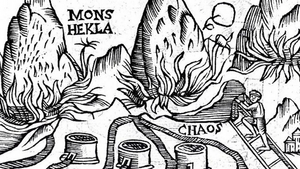Guest Blog: Alan Davey, Controller of BBC Radio 3, On THE SAGA OF BURNT NJAL
The Icelandic family saga will be broadcast on Sunday

The great thing about radio drama is that we can paint complex scenes and invoke whole new worlds through the power of storytelling, using sound alone. We can also experiment, and bring new stories that might ordinarily be a complex and expensive risk in the outside world to thousands of listeners. In one broadcast alone, we can reach an audience equivalent to several hundred theatres in one sitting, and that's why we also enjoy working with the theatre world to broaden reach, which is what we did in our Culture in Quarantine programming during lockdown.
The Saga of Burnt Njal, or Brennu-Njals saga, to give it its original Icelandic title, is a case in point. It is one of the greatest prose works in world literature, conjured up around the year 1000, but written down a couple of hundred years later. It is a work that contains a thrilling story, human truths, and superb characterisation; powerful heroic men, weak men, but above all, strong and memorable female characters. It features both gritty realism and the supernatural, and essentially contains many of the archetypes of the world of Game of Thrones, with characters driven by a combination of crushing fate and their own actions.
A saga is a kind of prose work, like a novel, written down in the Middle Ages, probably around the 13th century. Sagas tell stories about people living in Iceland at a time of great tumult in Icelandic history, when the nation - a republic without kings or queens - decided to convert to Christianity. It was a time where laws are discussed and judgments are made at the Althing or parliament - the oldest in the world. Sagas combine realistic details about everyday life and human behaviour, interspersed with references to the supernatural, with heroes who possess superhuman strength and exceptional intelligence, but are ultimately brought down by society or circumstances that they cannot overcome.
We know Icelandic film for their dark hued thrillers and brooding central characters, and Njals Saga is considered a national treasure in Iceland, and is, in a sense, where all that comes from. The action circles around Njal, a wealthy man with the power to see into the future, but who is regarded as less of a man because he does not have a beard. His friend Gunnar is a larger-than-life superhero: powerful, handsome (and, of course, bearded), he is feared by men and considered a great catch in marriage.
He ends up marrying Hallgerd, a proud woman, who is described as having 'thief's eyes', and with Mord (the villain of the story), they create discord and killing which is again and again repaired by the advice of Njal. However, Njal's sons become drawn into the web of discord which leads to the tragedy of the title: the vengeful burning of Njal, his wife Bergthóra, their household and farmhouse, and the death of Gunnar as a direct result of his wife Hallgerdr's refusal to help him. "I remember that slap," she says, referring to an argument that had happened earlier, as his fate is sealed.
Hattie Naylor has created a dramatic retelling of the story which reflects the oral origins of Njals saga - a story kept in memory and retold over a number of years until it was finally written down; the actors gather around the microphone and are interspersed with Icelandic contemporary music. The atmosphere created allows for this old story to come alive and for this great work of world literature to be received by a new audience who will thrill in the drama and characters and will be drawn into a neverending battle of good versus evil, truth versus lies, people versus the force of fate and circumstance.
Listen on BBC Radio 3 and BBC Sounds on Sunday 24 October at 7.30pm
Comments
Videos

